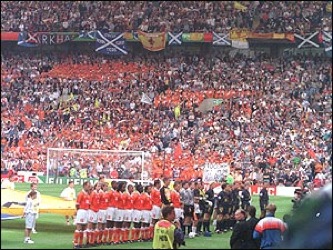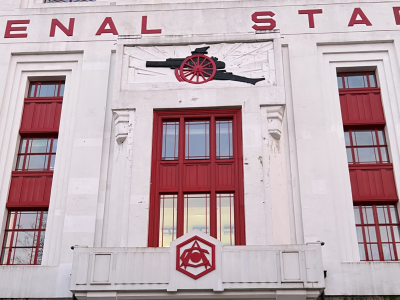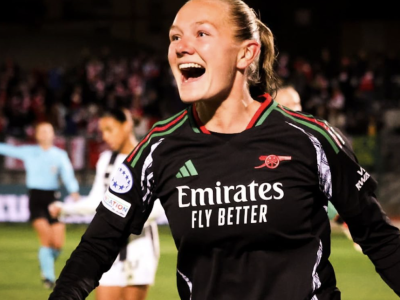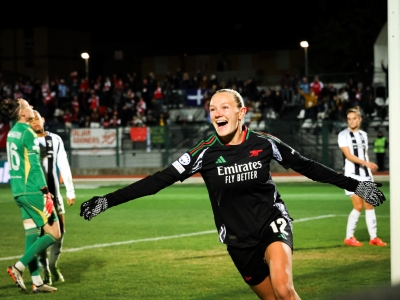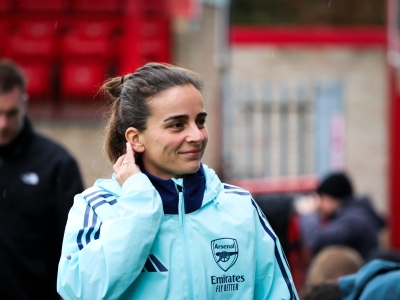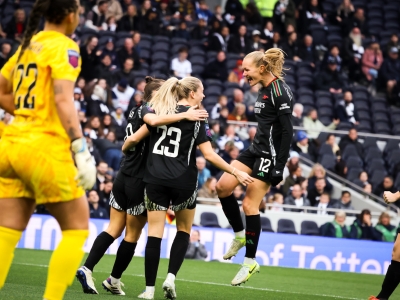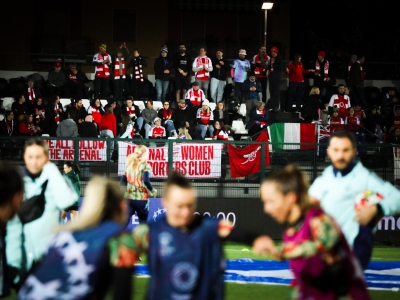One of the biggest gripes of people who have been watching Arsenal (or any other top Club for that matter) for more years than they care to remember, is that there are far too many “Johnny-come-lately” types watching with us. You know the people I mean – those who talk about the dark days, but their Arsenal memories include only the Wenger era, and their idea of the worst Arsenal player ever is “that bloke, wotshisname, that used to play up front” (I always ask them if they mean Lee Chapman, but they either haven’t got a clue who I’m on about, or try to be clever – “he played for Leeds, not Arsenal” is a common reply). There is no doubt about it but these people are a scourge on football lovers and they are ruining OUR game!
Or are they?
Could it be that these people, the Tarquins and Edwards who wouldn’t have been seen dead on the terraces, are actually part of what make football, and Arsenal, the global brand it is today? (I hate referring to Arsenal as a brand, but I’m sure you understand where I’m coming from). Well I actually think that they just might be.
Last night I was trawling through the BBC website in the vain hope that their may be some news of Arsenal’s shock signings of Gareth Barry and Klaas Jan Huntelaar, and I stumbled across a documentary that was made following Euro 96. As someone who no longer follows the fortunes of the National Team I thought back to that wonderful summer and nostalgia got the better of me. I clicked on the link and was transported back to June 1996. What I saw, and heard from the commentators, shocked me somewhat, and made me realise that the game really does need these fashionistas.
For those who are too young, or simply can’t remember, Euro 96 was when “Football Came Home” and Baddiel and Skinner penned possibly the greatest football song of all time. England actually had a decent side, with a good manager (Venables was also shrewd enough to employ Don Howe as his number 2), the best goalkeeper in the world in David Seaman, the best captain since Moore in Tony Adams and Alan Shearer at his absolute peak. Oh, and they also had a fired up Paul Gascoigne turning back the years.
For nearly three weeks the entire country basked in the glory of the England football team and they came within an ace of the final, but we won’t go there (it’s one of only three England games that still upset me – the others being the Italia 90 semi-final and the Holland World Cup qualifier in ‘93 when Koeman should have been sent-off – this is somewhat different to Arsenal disappointments which still hurt, of which there are a great many). It is easy to think of this tournament as being perfect in many ways, watched by packed stadiums up and down the country. However, watching the documentary showed me that this wasn’t the case.
Wembley, being the ground where England played all their games, was sold-out for every fixture up to and including the Final. However, the only other games that seemed to be played in front of a sell-out were those that Scotland played at Villa Park. Old Trafford, Anfield and St James’s Park in Newcastle were all half-empty throughout the tournament. Here we were, with our first major championship for 30 years, and the English public was so disenchanted with football that we couldn’t fill our grounds.
Quite frankly, looking back, it was embarrassing. It was, however, a symptom of the times. The Premier League had started and all-seater stadia were in but, in terms of entertainment, nothing much had changed on the pitch for many years as far as the general public were concerned. Those of us who actually watched football knew this wasn’t true, as we had Bergkamp at Arsenal, Gullit at Chelsea, and Cantona at Manchester United. These great players were, though, the exceptions to the rule. Euro 96 would bring a whole new view of football to a far wider audience.
As the success of the England team grabbed the national attention, people were drawn to watch the games on the TV. What those people saw was a type of football far removed from what they had witnessed years ago. There were no Norman Hunter style kickers, or mud-heap pitches. Instead there was Davor Suker chipping Peter Schmeichel after running 60 yards with the ball, there was Karel Poborsky using his left foot like a golfer’s sand-wedge to score. Most satisfying of all, of course, was the sight of Gascoigne showing real flair to score one of the great Wembley goals against Scotland and the collective England showing against Holland (my lower-sixth school report indicated to my parents that my poor exam result the following day was a direct result of England hammering the Dutch!)
There was also no sign of hooliganism inside the grounds, a problem that had driven many away over the previous 20 years or so. What was amazing when watching it back, was the sheer joy and astonishment in the voices of the BBC commentary teams – and not only at the England games. It was as though Euro 96 had liberated them from years of watching dull English club sides labouring around in dilapidated grounds. Suddenly we were seeing what the rest of Europe saw week-in, week-out. The English public loved it, and they returned to the national game in their droves. Not the working classes though. These “new” fans were the City and University types who followed the latest fads. People with money were getting in on the football act.
Later in 1996 a bespectacled, unknown Frenchman, came to join Arsenal as manager. Within a few weeks the team were playing a new, expansive type of football with the young Frenchman Vieira and the Dutch superstar Bergkamp very much to the fore. The new Arsenal was underlined by a late Tony Adams volley against Spurs in November of that year and, if you watch the Sky coverage of that game, Martin Tyler refers to Arsenal’s new brand of football and how it was typified by that goal.
Those lucky enough to have chosen Highbury as the place to watch their football as they boarded the Euro 96 football bandwagon have been fortunate enough to witness something that others had waited generations for. My Dad has followed Arsenal since 1950, and the last 12 years have seen his favourite ever player (Bergkamp) and the best football he has ever seen. Because of this football the Euro 96 bandwagon has kept rolling at Arsenal and has lead us into our new stadium. Without the johnny-come-lately types we wouldn’t have needed a new stadium as we would still have been playing to the hardcore of around 30,000 (and that is probably being generous).
So, next time you are about to slag off the bloke sitting nearby who is gobbing off about the old days being when John Hartson was playing, remember this: perhaps football really did start with Euro 96 - after all, it was certainly part of a massive change in the fortunes of our club. I will certainly have to think twice after what I watched last night.

